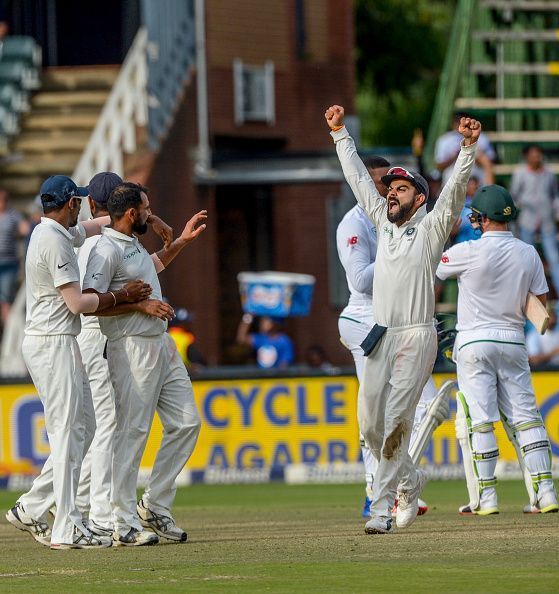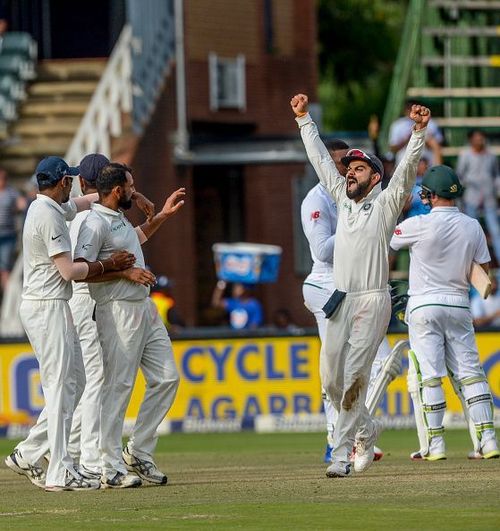
Of discipline, diligence, and dogmatism: Virat Kohli and his multiple facets
The recently concluded Test series against South Africa was one of the most anticipated overseas assignment that India played in in the past few years.
The end result, however, tells a different story. A 2-1 loss was just not what the Indian fans had in mind with the way in which Virat Kohli had been continuing his dream run as a Test captain.
While controversies clearly surrounded the exclusion of Ajinkya Rahane from the first two tests, and that of Bhuvneshwar Kumar in the second one, the last 18 months have revealed a lot about Kohli both as a player and a skipper. There were certainly no doubts about his ability to seamlessly carry forward his brilliance in the longest format of the game, but this last year and a half, he has literally surpassed Joe Root and Kane Williamson as a Test batsman, with only Steve Smith looking more hungry for runs.

Scripting success stories with such unprecedented consistency across all formats clearly reveal Kohli’s sense of focus, diligence, and discipline. He has already scored six double hundreds within this short span, won memorable Test victories against quality opponents, and deservedly earned some of the most prestigious awards that the ICC had to offer at the end of the calendar year.
What is equally commendable is that his remarkable run that began in West Indies in 2016 was almost immediately preceded by his inimitable form in the IPL. And this brings us to one of the most important hallmarks of any great player, namely adaptability. His uncompromising standards on fitness not only help him through all the formats, but also serve as a perfect countermeasure to an already exacting cricketing schedule. Add to this his beard and his tattoos, and he is nothing short of a heart-throb, a youth icon, and a cricketing superstar.
Kohli’s captaincy has definitely resulted in a palpable transformation in him as a player. He wants to bat longer, avoid lofted shots and run harder between the wickets. His concentration levels too have intensified. All of this is out there for the entire world to see, appreciate, and perhaps take inspiration from.
But then there is the other counter-narrative that has also unfolded within the same period, one that has been characterized by dogmatism, controversy, and difference of opinion. His ostensibly untenable partnership with Anil Kumble was not only a sore point in the history of Indian cricket but was also disconcerting because of the way in which it was handled. Suddenly it appeared as if Kohli had some chinks in his armor after all.
These blind spots are becoming increasingly visible with every episode of Indian cricket that does not pan out in the way that Kohli would have loved them to. Two successive losses against South Africa are further proof of this.
If ‘horses for courses’ is Kohli’s preferred modus operandi of picking his team ahead of a Test match, there seems to be a fundamental contradiction here. His rationale behind choosing Rohit Sharma over Rahane was not because Sharma has done well overseas, in the past, but purely because of current form. On the contrary, Rahane who has had an excellent record outside the subcontinent, surprisingly failed to make it to the team even though he was the so-called perfect horse for the South African courses.
Besides, if current form was the judgmental parameter for Sharma’s inclusion, that still does not explain why Bhuvneshwar was immediately dropped after the first Test. After all, he was the star performer for India in that match; picking up 6 wickets and stitching an important partnership with Hardik Pandya in the first innings. Based on current form, nobody else deserved to play the second Test more than Bhuvneshwar.
The very fact that both Kumar and Rahane played pivotal roles in the final match of the series that India won, revealed how this could be a lesson in disguise for the upcoming tours of England and Australia.
However, here too, in the post-match press conference Kohli was solely focused on celebrating the incredible win without even dropping a hint about the learning curves that might have come his way. It almost appeared as if he was simply defending his decisions through this victory.
And there lies the rub. While his combative temperament, scintillating stroke-play, and tremendous self-belief clearly bring out the best in him as a batsman, his unapologetic attempts to exercise almost total authority as a captain can at times work against his own sincere efforts to do the best for the team. Caring about what everyone has to say about the selection processes is certainly not the right way but it is also important not to lose track of objectivity and accept constructive criticism gracefully.
This also brings us to one final point, which is fielding a different team in every Test match. A strategy such as this can be particularly unsettling for the players, more so on overseas tours. Kohli himself had had a horrendous run against England in 2014. But because the captain, the coach, and the team management persisted with him, he could really turn things around quite admirably in Australia with four centuries.
His statistics are phenomenal, his commitment exemplary, and yet his decision-making skills as a captain leave a lot to be desired. As a player, he always comes back stronger after a failure. He learns from his mistakes, does a lot of soul-searching, and always emerges on the other side, triumphant and more competitive than ever before.
One could only wish that he starts doing the same in so far as his strategic methodologies as a captain are concerned.
The views expressed in this article are those of the author and they do not necessarily represent the views of Sportskeeda.